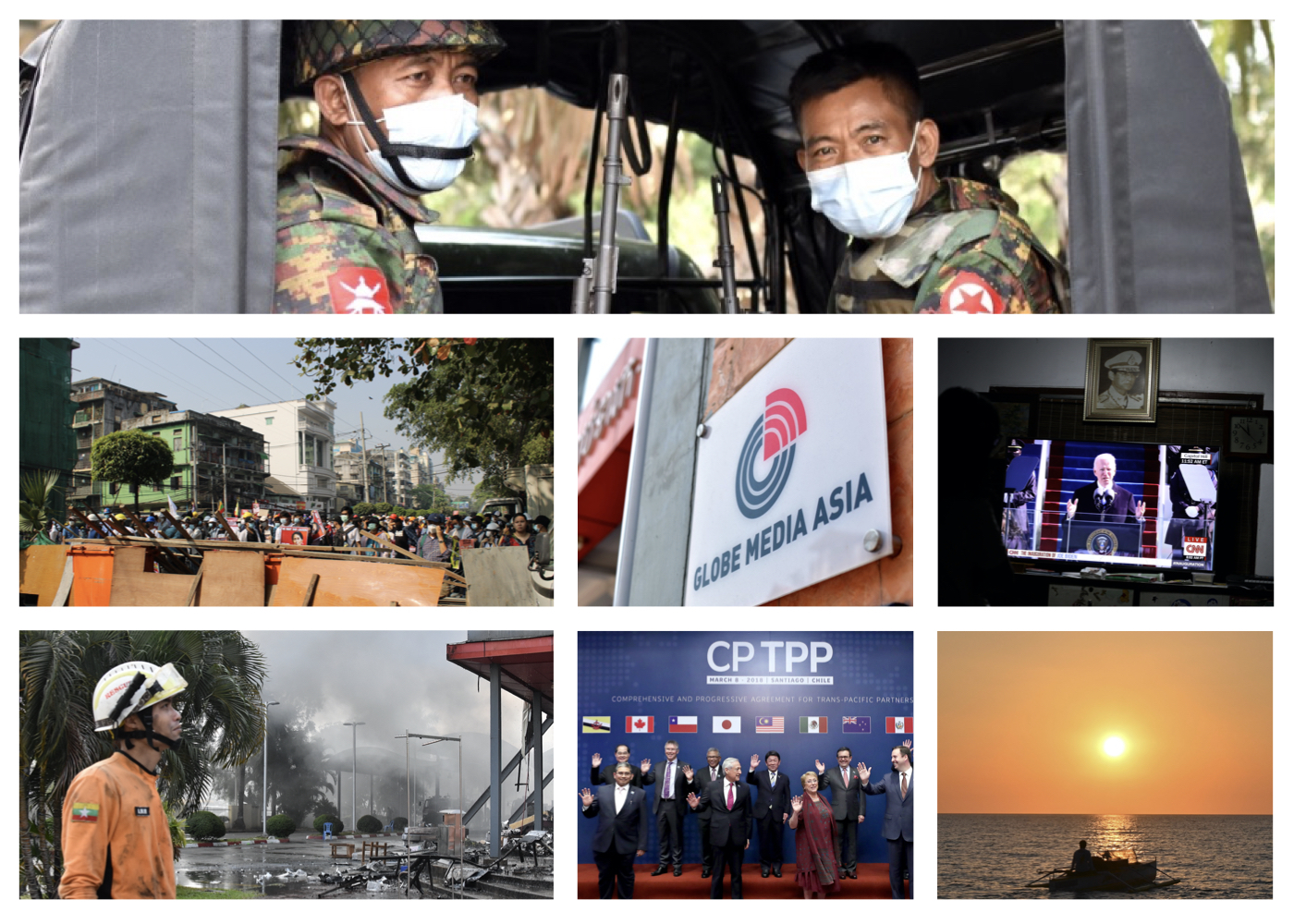This week’s theme is a hefty one, and it’s almost all about Myanmar. Count this as the big reveal of the mysterious project both Alastair and myself have been referring to in past editorials. If you haven’t yet seen, Globe reporter Allegra Mendelson went to Myanmar last week as part of a press tour organised by the military there. Thanks in large part to mass exposure of the junket through CNN, the only other media participant besides Globe, the trip became a lightning rod for social media debate on how the press should interact with the coup regime.
As a team, we had discussed potential ethical issues with the trip at length in the weeks before the trip, turning it over in hours of discussion after the offer to visit was first extended to Allegra seemingly at random by the new junta’s (very shady) PR representative. But even that didn’t fully prepare us for the moment we learned that 11 people who had interacted with the press tour in a market in Yangon were arrested by plainclothes security officers just minutes after reporters left the scene. We address that incident in more detail in an editor’s note from EiC Alastair McCready, which you can find here.
I should also mention that this trip came at significant cost and was not funded by the military, making it crucial for us to seek outside support to send Allegra to Myanmar. Most of that came from the Pulitzer Center, which very generously extended us a grant of $3,000 to cover the bulk of the cost. We also pitched our coverage of the trip to other media outlets before Allegra left Cambodia, and on Wednesday published our first article from Myanmar in partnership with Al Jazeera. As of now, we’re planning to publish our second and final piece from the trip today along with the Washington Post. That’ll be a first-person narrative from Allegra’s time in Myanmar, centered on her time in Yangon and the events leading to the arrest of the 11 people in the market.
We also held a webinar just this morning to give our readers, as well as the wider community from Southeast Asia and further abroad, a chance to hear directly from us about how this all came about. We’re all still navigating some of the ethics of covering post-coup Myanmar and, seeing the controversy generated by CNN’s approach, we wanted to explain some of our own justification for the trip, as well as give Allegra a chance to speak directly to readers about the full experience. You’ll be able to find a recording and brief write-up of the event on our website as soon as Monday.
An additional Myanmar piece this week comes from on-the-ground reporter Eustace Jones, who’s been in Yangon from the start of the coup. A few days stand out among the bloody weeks since then, among those being the March 8 siege of Sanchuang township. A 12-hour ordeal in which security forces, hunting protestors, surrounded some 200 people in a four-street area in the up-and-coming neighbourhood of the same name. In the days after the siege, Eustace spoke with residents to learn more about the harrowing experience.
But we also did plenty outside of Myanmar this week, including saying a warm “see you later” to our friend and former reporter Ashley Lampard, who’s leaving the hallowed halls of Globe world in the hopes of earning a master’s degree in journalism. In his final piece (for now), Ashley took a deep dive into collision of food security and naval control of the South China Sea. With so many in Asia depending on fish from the sea, some experts say China is angling to set itself up as the biggest player in a massive fishing industry — selling the catch back to displaced claimants of the sea. Provocative stuff, read it here.
Last but certainly not least, we have a pair of analytical columns from the geopolitical world. The latest US Interim National Security Strategic Guidance (INSSG) document, released March 3, helped detail the foreign policy approach of President Joseph Biden. But as Globe columnist Sek Sophal points out here, the strategic listing of commitments to security partners made two glaring omissions — major US security allies Thailand and the Philippines, both key players in the Western giant’s Southeast Asia diplomacy. The move could imply big policy for the next four years.
Finally, we have to ask the question: In a globalised world, what do regional distinctions even mean, anyway? Daniel McKay, an associate professor at Japan’s Graduate School of Global Studies, came to us with this witty piece on the implications of the UK (a decidedly non-Pacific nation) lobbying for entry to the Comprehensive and Progressive Agreement for Trans-Pacific Partnership (CPTPP) trade bloc. The big title underpins the deal’s big potential, and McKay does well to sketch out the implications of a possible UK entry.


